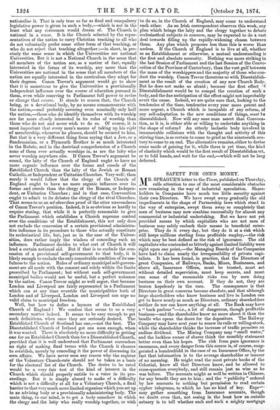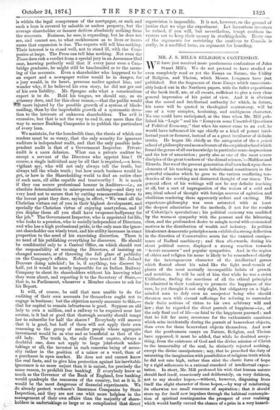SAFETY FOR ONE'S MONEY.
AIR. SPRAGUE'S letter to the Times, published on Thursday, calls attention to one of the most considerable obstacles now remaining in the way of industrial speculation. Share- holders in Companies have much too little security against their own Directors. We have swept away gradually the old impediments in the shape of Partnership laws which stood in the way of enterprise, swept them away so completely that men of business may now combine successfully for almost any commercial or industrial undertaking. But we have not yet provided means by which capitalists who are not men of business may safely embark their means in beneficial enter- prise. They do it every day, but they do it at a risk which still keeps millions sterling from profitable employ,—the risk which may be best defined as the risk of ignorance. The old capitalists who contended so bitterly against limited liability were• right upon one point,—the Managing Boards of the Companies have had to claim nearly the irresponsibility of private capi- talists. . It has been found, in practice, that the Directors of great Companies, of Railways, Banks, Mines, Businesses, and above all, Insurance Offices, must be trusted, must act without detailed supervision, must keep secrets, and must run some of the reasonable risks run by men doing business on their own account. If they do not, they are beaten hopelessly in the race. The consequence is that Directors in great concerns become absolute and that although large shareholders who know business and live in London can get to know nearly as much as Directors ordinary shareholders neither do nor can know anything at all: The Bank may have a " back parlour "—i.e., a lot of dangerous, though profitable business—and the shareholder know no more about it than the beadle who opens the doors for the depositors. The Railway Company may have next year to renew its rails or rolling-stock, while the shareholder thinks the increase of traffic promises an endless dividend. The Mining Company may "smell water," and the luckless owner of shares think the monthly statement better even than his hopes. The risk from pure ignorance is enormous, and every danger from this source is, of course, exag- gerated a hundredfold in the case of an Insurance Office, by the fact that information is to the average shareholder or insurer of no meaning. He might read the most private books of the Celestial, know all that Directors know, and be allowed to cross-question everybody, and still remain just as wise as he was before. The accounts might as well be written in Chinese, for any benefit they are to him ; and the " publicity " ordered by law amounts to nothing but permission to read certain cypher telegrams, to which he has no kind of key. Expe-1- may gather something from Insurance accounts, though- we doubt even that, not seeing in the least how an outside actuary is to tell whether such and such a mighty mortgage
is within the legal competence of the mortgagor, or such and supervision is impossible. It is not, however, on the ground of justice that we urge the experiment. Let incautious investors be ruined, if you will, but nevertheless, tempt cautious in- vestors not to keep their money in stocking-heels. Every one of the arguments for restricting the cautious to Consols is really, in a modified form, an argument for hoarding. such a loan is covered by saleable or useless property, but the average shareholder or insurer derives absolutely nothing from the accounts. Business, he sees, is expanding, but he does not see, and cannot see, to what recklessness as to lives or insur- ances that expansion is due. The experts will tell him nothing. Their interest is to stand well, not to stand ill, with the Com- panies at large. The Press cantell him nothing. Not even the Times dare risk a verdict from a special jury in an Assurance libel case, knowing perfectly well that if every juror were a Cam- bridge graduate, he might still be bamboozled as to the mean- ing of the accounts. Even a shareholder who happened to be an expert and a newspaper writer would be in danger, for a jury would, in its heart, presume malice against him, and wonder why, if he believed his own story, he did not get out of his own liability. Mr. Sprague asks what a conscientious expert is to do. Hold his tongue, we should say, as an attorney does and for this clear reason,—that the public would more injured by the possible growth of a system of black- mailing, than by the improbable growth of a systematic devo- tion to the interests of unknown shareholders. The evil is • excessive, but that is not the way to end it, any more than the way to secure Banking Companies is to publish the particulars of every loan.
We maintain, for the hundredth time, the thesis of which our readers must be so weary, that the only security for ignorant auditors is independent audit, and that the only possible inde- pendent audit is that of a Government Inspector. Private audit is a mere delusion. What can a private auditor be, except a servant of the Directors who appoint him? Of course, a single individual may be all that is required,—a keen, vigilant spy, who will not only always tell the truth, but always tell the whole truth ; but how much business would he get, or how is the Shareholding world to find an entire class of such men, all alike capable and trustworthy ? It is much if they can secure professional honour in Auditors—i.e., an - absolute determination to misrepresent nothing—and they try very hard not to secure that by cutting remuneration down to the lowest point they dare, saying, in effect, "We want all the Christian virtues out of you in their highest development, and specially the Christian virtue of enjoying martyrdom, and if you display them all you shall have twopence-halfpenny for the job." The Government Inspector, who is appointed for life, who looks to apension, who is socially independent of Directors, and who has a high professional pride is the only man the ignor- ant shareholder can wisely trust, and his utility increases in exact proportion to the need of his exercising discretion. There is no need of his publishing everything he discovers. He should be confidential only to a Central Office, on which should rest the responsibility of warning the Directors, of insisting on changed accounts, or of throwing the full glare of publicity on the Company's affairs. Nobody ever heard of Mr. Juland Danvers doing mischief ; he is, if anything, too discreet by half, yet it would be nearly impossible for an Indian Railway Company to cheat its shareholders without his knowing what they were about, and reporting it to the Secretary of State,— . that is, ta Parliament, whenever a Member chooses to 'ask for his Report.
It will, of course, be said that men unable to do the auditing of their own accounts for themselves ought not to engage in business; but the objection merely amounts to this,— . that for capital to remain infruetuous is good. Suppose an old lady to own a million and a railway to be required near her estates, is it bad or good that thorough security should tempt her to subscribe for half the shares ? Everybody will answer - that it is good, but half of them will not apply their own reasoning to the group of smaller people whose aggregate investment would be as wise and as beneficial as that of the old lady. The truth is, -the rule Caveat emptor, always a doubtful one does not apply to large joint-stock under- takings at all, the investor in such concerns being of neces- sity rather in the position of a minor or a ward, than of a purchaser in open market. He does not and cannot know the real facts, and to give him protection against his inevitable ignorance is no more unjust than it is unjust, for precisely the same reason, to prohibit free banking. If everybody knew as much as the Governor of the Bank of England, free banking would quadruple the resources of the country, but as it is, it would be the most dangerous of financial experiments. We do already protect workmen's Insurance Companies by State Inspection, and they are not one whit more helpless in the management of their own affairs than the majority of share- holders in undertakings so large or so coiliplicated that direct



































 Previous page
Previous page